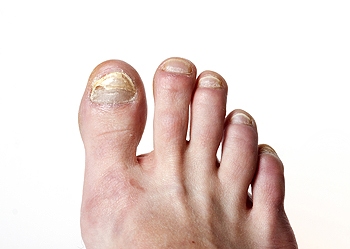Elderly Toenail Fungus

Aging is a risk factor for many diseases. Seniors take more medications, have weaker immune systems, and are more apt to suffer from pre-existing medical conditions, as well as mobility issues. While elderly nail fungus is not generally severe, it can be uncomfortable, and if left untreated, complications such as permanent nail damage or more serious infections can develop. Nail infections are caused by fungal organisms called fungi. These fungi can feed on keratin, present in the nails, hair, and skin. Such infections can also be caused by yeast and mold spores. The fungi get into the skin and nails from direct contact with infected materials, whether from animals, people, or clothes. Elderly nails are more likely to become brittle and have more cracks, and this makes it easier for the organisms to get inside and spread. Toenail fungus is more common than fingernail fungus. Symptoms typically include thick, discolored, brittle and damaged nails, with jagged edges and possibly a bad odor. Pain may also be present. Toenail fungus may be more prevalent in those with diabetes, recurring skin conditions, and circulation problems as these hinder the body’s ability to fight infection. If you are elderly or taking care of someone who has toenail fungus is a concern, contact a podiatrist who can help you with all foot and ankle-related conditions.
If left untreated, toenail fungus may spread to other toenails, skin, or even fingernails. If you suspect you have toenail fungus it is important to seek treatment right away. For more information about treatment, contact one of our podiatrists of Westside Podiatry Center, LLP. Our doctors can provide the care you need to keep you pain-free and on your feet.
Symptoms
- Warped or oddly shaped nails
- Yellowish nails
- Loose/separated nail
- Buildup of bits and pieces of nail fragments under the nail
- Brittle, broken, thickened nail
Treatment
If self-care strategies and over-the-counter medications does not help your fungus, your podiatrist may give you a prescription drug instead. Even if you find relief from your toenail fungus symptoms, you may experience a repeat infection in the future.
Prevention
In order to prevent getting toenail fungus in the future, you should always make sure to wash your feet with soap and water. After washing, it is important to dry your feet thoroughly especially in between the toes. When trimming your toenails, be sure to trim straight across instead of in a rounded shape. It is crucial not to cover up discolored nails with nail polish because that will prevent your nail from being able to “breathe”.
In some cases, surgical procedure may be needed to remove the toenail fungus. Consult with your podiatrist about the best treatment options for your case of toenail fungus.
If you have any questions, please feel free to contact one of our offices located in Liverpool, Camillus, Skaneateles, Oswego, and Cicero, NY . We offer the newest diagnostic and treatment technologies for all your foot care needs.
